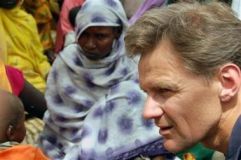UN’s Egeland blocked in Darfur by government
Nov 17, 2006 (KHARTOUM) — A frustrated U.N. humanitarian chief Jan Egeland cut short his trip to Darfur on Friday and returned to Khartoum after the government blocked his access to camps housing Darfuris who have fled rape, murder and pillage.
 Khartoum officials say security has improved in Darfur since a May peace deal signed by only one of three rebel negotiating factions.
Khartoum officials say security has improved in Darfur since a May peace deal signed by only one of three rebel negotiating factions.
But government security officials told Egeland, who was in Darfur on his final visit to refugee camps as U.N. envoy, it was too dangerous for him to travel outside Darfur’s state capitals.
“Government security has said I cannot go, which means I refuse to go only to offices. … I will return now to Khartoum,” he told reporters in West Darfur’s state capital el-Geneina before leaving western Sudan.
“I regret that because it is my job to see how aid work is going and how aid work is prevented, and I am now prevented from seeing that here.”
Darfur houses the world’s largest aid operation with 14,000 staff working to help more than 3 million people in need. But banditry on the roads, bureaucratic obstacles from authorities and ongoing fighting has hampered their efforts.
Sudan has signed agreements with aid agencies to allow free access but each week layers of new bureaucracy are added which hinder travel in the vast region the size of France.
Egeland said after meetings with non-governmental organisations that access and protection of civilians was at its worst since the conflict began in early 2003.
“It is an unacceptable situation,” he said. “Here in West Darfur it has gone from bad to really catastrophic in terms of lack of access to civilians and lack of protection of civilians.”
In Addis Ababa on Thursday Sudan agreed to a U.N. support package for the African Union, whose forces have struggled to quel the violence in Darfur. But Khartoum did not back down on its rejection of a U.N. Security Council resolution authorising 22,500 U.N. troops to take over from the AU.
“So far it is an agreement that the United Nations can help the AU force to become more effective,” Egeland said.
“Later on I hope that it could be a U.N. force or a U.N-African Union force that is well enough resourced with a strong enough mandate to protect the civilian population and stop this carnage.”
“SITTING IN KHARTOUM”
There are an estimated 2.5 million refugees in camps in Darfur and across the border in Chad. Witnesses said the eight camps around el-Geneina town have been infiltrated by armed men terrorising residents who fled their homes three years ago to seek refuge from violence.
“There are NGOs here who have half their staff sitting in Khartoum … they have no travel permit, they do not get a visa, they have to spend more of their time doing paperwork than helping the people,” he said.
“The Sudanese should help us help their people, not prevent us helping their people,” he said.
Experts say 200,000 people have been killed in Darfur, after mostly non-Arab rebels took up arms against central government accusing them of marginalising the remote region.
Khartoum mobilised militia to stop the revolt. Those militias stand accused of a campaign of rape and murder called genocide by Washington. Khartoum denies genocide.
Egeland urged AU forces to be proactive in exercising their mandate which allows them limited powers to protect civilians.
But AU sector commander in el-Geneina Garba Ahmed said is troops needed more help. “The best scenario would be more troops, more equipment (and) an enhanced mandate to enable us to act more effectively,” he told reporters.
“Once we are appropriately equipped and the number are increased we will do better.”
Sudan says a U.N. force is a front for Western colonisation. Critics say Khartoum fears those troops would arrest any officials likely to be indicted by the International Criminal Court investigating alleged war crimes in the region.
(Reuters)
